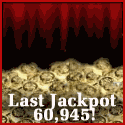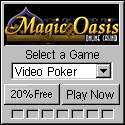Play
To Win
Tips and strategies to help make you a winning casino player Game
Rules
Learn: Blackjack, Baccarat, Craps, Roulette, Slots, Video Poker, Pai Gow Poker
Systems Gallery
Win more, more often with proven betting methods from the systems gallery
Order
Form
A secure on-line order form to purchase products advertised by Let's Talk
Winning.
Playing Online
All about gambling at online casinos. Find out where the best deals are
Links
and Things
Sign our guestbook, refer a friend, link to other gambling sites
Newsletter
Click above to read the current edition of our
weekly newsletter. Then get your own free subscription right here. Enter your e-mail
address for immediate delivery of an introductory issue, including a FREE ROULETTE SYSTEM:
Please tell all
your friends about it.
On-Line Forum
Post a gambling question or opinion - get an
answer . . .
 Wanna Win At Slots? Click
Here! Wanna Win At Slots? Click
Here!






It's now $50 bonus every month!





|
=========================================
Thursday, August 23, 2001
Worst
Wagers to Avoid
Hello
everyone,
It
is as important to know which wagers of the house should be avoided, as which ones to bet
on. This week Andrew N.S. Glazer clarifies them.
Visit any casino anywhere in the world, and you will always find hordes of
players
who are trying to beat the house at the worst games in the joint or choosing the worst
bets available at games like craps that offer both good and bad bets.
Does this happen because gamblers want to lose their money? I don't think
so. Although there certainly are some players who subconsciously want to
lose - more about them in a moment - in the main, I think the reason why this
happens is a lot simpler. It can be explained in the words of an anonymous wise man who
once said, when asked to define the difference between ignorance and stupidity, "I
don't know, and I don't care." There's the essence. Ignorance is saying "I don't
know." A lot of people who visit casinos don't know that the odds on certain bets are
much worse than others. They just know they're on a gambling expedition, and figure that
they'll win if they're lucky and lose if they're unlucky. They don't
realize that when they make certain kinds of bets, they have to get VERY lucky to win,
while with other bets, they only have to get a little lucky. As most high school
boys learn in their early dating experiences, it's much easier to get a little lucky than
it is to get a lot lucky.
To help you avoid some of the biggest pitfalls in gambling, here's a rundown of the worst
bets in the house, so you can be sure to run, not walk, away from these on your next
casino visit. Then, after you're armed with enough information to stay out of the "I
don't know" group, l'll look into a few of the reasons why some players
might not really care.
1. (Tie) Keno and the Money Wheel
The house edge: Each of these games has a house edge that is somewhere in
the 25 to 30 percent range, depending on the precise bet you select. A game of
keno might seem to go more slowly than the Money Wheel does, but actually the typical keno
player gives the casino much more action than the typical Money Wheel player, because it's
so common for players to play their keno tickets more than one way.
The attraction: For keno, the draw is the big money. It can cost as little as $1 to play,
and you're taking a shot at, say, a $250,000 jackpot. Blinded by the glare of that big
payoff, people invest in a game that looks favorable only when compared with a similar
game with even worse odds: the lottery. With the Money Wheel, the attraction is
simplicity. It's frequented almost exclusively by casino newcomers who feel intimidated by
games like craps and blackjack. The Money Wheel looks just like the familiar games in
carnivals back home, but at least this wheel is honest. The casino doesn't have to cheat
you, because the house edge makes it pretty much like stealing, anyway.
2. The Craps "Zone of Foolishness"
The "Zone of Foolishness" is my nickname for the high odds bets found in the
center of any craps table: the Hardways, Any Seven, Any Craps and the single-roll
propositions like 30-to-1 for double 6's or double 1 's.
The house edge: It ranges anywhere from 9.19 percent for the Hard 6 and Hard 8 up to 16.7
percent for the Any Seven bet.
The attraction: Big odds and instant gratification. A common theme on all of the "bad
bets" in craps is that they pay mighty well when you actually hit them. A Pass line
bet is a much more sensible wager, but the Pass Line pays only even money. Also, sometimes
it takes quite a while to get a decision on a Pass Line bet-on the one-roll propositions,
you win or lose your bet immediately. This is another common theme among the casino's
worst bets: You get to learn what happens instantly. The house knows that some gamblers
can't bear to wait, and charges them for their impatience.
3. The progressive Jackpot side bets in Caribbean Stud and Let It
Ride
The house edge: Your expected loss varies depending on how high the progressive jackpot
is, or what the pay table is at Let It Ride, but usually you're
in the 25 percent disadvantage range, and often higher. I rank this lower than the craps
Zone of Foolishness, even though the house edge is higher, because you can only lose $1 at
a time, and you probably can't play more than 60 hands an hour.
The attraction: (Surprise!) Big money. I've never seen one of these jackpots below
$10,000, and they usually hover somewhere in the $30,000 to $50,000 area - but with the
odds of a royal at 650,000-to-1 against, the side bets are still a very bad idea. Along
with the dream of riches, though, add in one extra incentive: fear. "What if I were
playing, and I caught a royal flush, and hadn't made the side bet? I'd feel
horrible!" Some players make this bet out of a kind of emotional self-defense.
4. The Tie bet in baccarat
The house edge: This one land mine planted in the middle of an otherwise pretty good game
has a house advantage of 14.1 percent.
The attraction: An 8-to-1 payoff, and the ability to think you look like a genius if you
win. A lot of baccarat players make a big deal of "tracking" hand results and
looking for some sort of pattern. The house encourages this by providing free pencils and
tracking sheets to any player who wants one, which pretty much tells you what the house
thinks about the value of this information. Ever see a dealer let
blackjack players take notes?
5. Parlay cards in the sports book
The house edge: Varies, depending on how many games you're trying to parlay: The more
games you parlay, the worse the deal gets.
The attraction: High odds, but mostly, .no need to fear losing your nerve. Unless you
stumble onto a wonderful opportunity to parlay three related events, like "first half
goes Over," "second half goes Over," and "game goes Over," any
sports bettor could create his own parlay just by making a bet, and if the bet wins,
letting his winnings ride on a second (or third or fourth) bet. Using the
"self-parlay" method,
you're getting a fair price on getting two or three games right. The problem, for most
gamblers) is that once they've won the first two bets, they don't want to make the large
bet on the third game. They - correctly - understand that the money they've won now
belongs to them, not the house. So instead, they pay the casino a hefty premium for
letting them string three bets together without having to feel bad if the third bet in the
series loses.
6. Insurance at blackjack
The house edge: About 12.4 percent, depending on the number of decks in the game, unless
you're a card counter who knows something. And actually, a smart card counter STILL
wouldn't make this bet, because it would give him away in a second. When you're staring at
an Ace, there are four cards (10-J-Q-K) that give the dealer blackjack and make your
insurance bet a winner. There are nine cards (A-2-3-4-5-6-7-8-9) that make this bet a
loser, so you're getting paid 2-to-1 (the equivalent of 8-to-4) on what is a 9-to-4
proposition.
The attraction: "Help, save me!" An Ace is a scary card to see in the dealer's
hand. Some players figure by taking insurance, they protect a good (or bad) hand. A lot of
players who don't insure otherwise WILL take insurance when they have blackjack
themselves, taking the "guaranteed even-money payoff." That is a very short-term
view. Insurance has NOTHING to do with your hand: It's a bet on the dealer's hand, and a
bad one at that.
In sum, just about anytime the casino offers you a form of gambling where
the game is extremely easy, pays very high odds or offers some form of instant
gratification, comfort or convenience, you're probably looking at a bad bet.
I hope that explanation will inform the "I don't know" group of gamblers. The
more mystifying group is the "I don't care" group, the gamblers who understand
that Hardway bets are bad gambles but who play them anyway.
The rationale for some members of this group is easy enough to figure out.
They want to lose because they feel they deserve to lose or deserve to be punished. The
potential explanations for this sad attitude are many, but I don't want to dwell on, them
here. There are other gamblers who WANT to win, but who still find themselves drawn to the
lottery like a moth is drawn to a flame - and usually with about the same results.
Some gamblers who know better can't resist the lure of the bad bet, just because they love
action more than they love money. For members of this group, the thrill they get from
taking risks is more important than gambling well. Some people climb mountains, jump out
of planes or indulge in street luge, and feel better for the challenge. Others, who aren't
comfortable risking their bodies in that way, are perfectly at ease risking their money.
To these people, a winning bet is better than a losing bet, but a losing bet is better
than no bet. So when they visit a craps table, they can't stand to keep their action
confined to Pass Line and Come bets. They want or need more to build the thrill to maximum
pitch, and so they scatter money on the less advisable propositions.
Other "action" bettors seek out bad bets because they want
maximum risk, and they feel - with justification - that bad percentage bets are riskier
than good percentage bets. They get more of a thrill from winning bad bets than from
winning good bets. It's not about money: It's about adrenaline, and their adrenaline flows
faster when they know they're going out on a limb.
But there's one reason left that draws even more people to bad bets than anything I've
listed so far: the need to be rewarded.
During his great day at the races in the movie Let It Ride, Richard Dreyfuss
exclaims in delight, "God likes me!" A great many gamblers are convinced
sometimes at a conscious level, sometimes at a subconscious level - that
their God or The Universe will reward them for being a good person. They are
convinced that while gambling might have its math and statistics, Lady Luck
has her favorites, and the person who is living a good life, or who has good
karma, is the fair and just recipient of the good fortune that Higher Powers
will dole out.
Because I have no knowledge of how the universe is actually run, or by whom it is run - I
have my theories, but I won't bore you with them - I can't directly dispute the "God
likes me" group. Maybe things do in fact work that way. But I do have a couple
of thoughts that might slow this group down a bit.
Suppose you have indeed lived a good life or done good deeds, and suppose your God DOES
want to reward you for your good life. Do you really think that He needs you to visit a
casino in order to reward you? It would be just as easy for him to get you a raise at
work, an inheritance, the right stock pick or some other types of financial rewards. And,
of course, a "reward" need not be financial. You might stay
healthy, find the right mate or have wonderful children.
If you insist on a financial reward, though, try Izak's Reward system. It has proved so far to be a very rewarding
system to everyone who has tried it.
I don't have answers for these philosophical questions, but I think you can see that
making bad bets so that you can put yourself in a position to be rewarded by Higher Powers
is risky. Higher Powers work in mysterious ways. I don't judge those who are
attracted to bad bets, but in my own gambling I follow the advice of the writer Damon
Runyon, who once said, "The race is not always to the swift, nor
the battle to the strong, but that is the way to bet."
Wishing you
all the best,
Until next week,
Izak
| WOULD YOU LIKE
TO SUBSCRIBE? |
 |
If you missed any
newsletter, click here for an archive.

|
 Let's Talk Winning
Let's Talk Winning